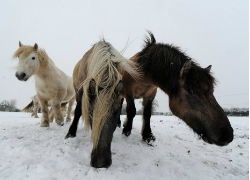
Europe is currently in an uproar over issues in the meat industry. Most recently, large quantities of horse meat were found in products that are supposed to be 100% beef, sold in Sweden, the United Kingdom, and France, among others. Although there are no health issues directly related to the use of horse meat, and it is perfectly acceptable to eat, this is nevertheless a huge issue affecting an industry in which everyone is now playing the blame game.
Grocery stores in the affected countries are pulling the Comigel products “contaminated” with horse meat from their shelves. At least one chain of grocery stores has initiated legal proceedings against Comigel, with many more likely to follow. France also seems to be pushing hard for sanctions, although the Agriculture Minister acknowledges the difficulties in traceability. Such difficulties are already apparent as Comigel is claiming that it was “fooled” by a supplier. Really, this is a question of how deep the fraud runs.
Comigel is now claiming that the horse meat in question originally came from Romania, which exports 10 to 12 million euros worth of horse meat every year. Romanian Prime Minister, Victor Ponta, says there has been no breach of rules or standards by any Romanian countries. It is not yet clear how Romanian involvement may affect any lawsuits relating to the use of horse meat in beef products, but it is an indication of how many companies might ultimately be involved in such lawsuits. Since the legal action is only just beginning, it seems that there is a great likelihood that there will be significant, widespread litigation.
Currently, many of the affected countries are initiating investigations and testing to determine the extent of the problem, how to proceed, and how to prevent this sort of fraud in the future. Great Britain is instituting product testing from here on out to ensure the integrity of meat used in certain food products. Others countries are also expressing intent to do increased, randomized testing to prevent this from happening again. These countries are also investigating to determine the sources of the horse meat and how best to proceed in litigation.
Despite the somewhat understandable uproar, there are currently no indications that the use of horse meat in these products has harmed anyone. Certainly these companies have a serious issue on their hands due to the fraud and misrepresentation, as well as many people’s preconceived notions about eating horse meat. Some have also expressed concern about veterinary drugs commonly used to treat horses showing up in the meat. This concern is well-founded in that these drugs can be harmful to humans, but, so far, there is no evidence that these drugs have actually shown up in the meat. Although this is a huge legal issue in which many have a significant stake, it is interesting to see how the notions developed by modern society greatly influence issues such as this.
Rachel Sipkin is a 3L and the Training Editor of the Denver Journal of International Law and Policy.

